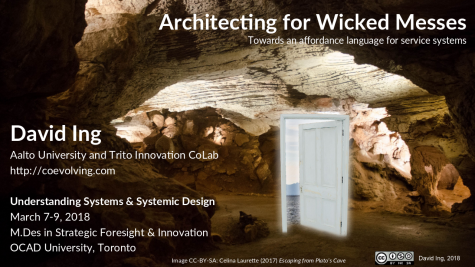Each year, my lecture in the “Understanding Systems & Systemic Design” course — in the program for the Master of Design in Strategic Foresight and Innovation at OCAD University — reflects where my research is, at that point in time. For 2018, the scheduling of my visit was towards the end of a busy winter. Firstly, I had just finished teaching a Systems Methods course at the UToronto iSchool. Then, the Open Innovation Learning book was officially launched. Less than 6 months earlier, I had conducted a workshop at the Purplsoc 2017 meeting, and at the PLoP 2017 meeting. This shaped an agenda for the prepared slides as:
- 1. Designing for tame problems c.f. Architecting for wicked messes
- 2. Analyzing the complicated c.f. Synthesizing the complex
- 3. Unfreeze-change-freeze c.f. Co-responsive movement
- 4. Planning (teleology) c.f. Programming (teleonomy)
- 5. Industrial value chain c.f. Co-producing offering
While the lecture slides were the same for two class sections spaced 2 days apart, the verbal content varies as spontaneous flow. On both days, agenda point 4 (Teleology c.f. Teleonomy) was cut short to jump to a few ideas in point 5. (On the second day, a question from a student led back to point 4).
Both lecture days took a break after about 90 minutes. Thus, there are four recordings total, i.e. two part for each of two days, in two playlists. The videos online at Youtube are embedded below, and downloadable versions of audio and video are further down.
For March 7, the recording with the full-time students as 20180307-OCADU playlist runs 1h30m and then 0h36m. We covered up through agenda point 3 before the break.
Continuing after the break, continued into agenda point 5 for less than 30 minutes, and then finished off with almost 10 minutes of discussion.
For March 9, the recording with the part-time students as 20180309-OCADU playlist runs 1h24m and then 1h08m. Somehow, the covering the first three points before the break were taking longer than on the prior day.
After the break, the lecture continued for about 50 minutes. The ensuing 20 minute discussion responded to question that drew back through agenda points not originally covered.
For listeners on mobile devices, downloaded files may be easier. Versions with digitally boosted volume are also available.
| Audio | |||
| March 7 (part 1 of 2, 1h30m) |
[20180307_0850_OCADU_Ing Architecting.mp3] (83MB) [20180307_0850_OCADU_Ing Architecting 3db.mp3] (volume boosted 3db, 83MB) |
||
| March 7 (part 2 of 2, 0h36m) |
[20180307_1100_OCADU_Ing Architecting.mp3] (34MB) [20180307_1100_OCADU_Ing Architecting_3db.mp3] (volume boosted 3db, 34MB) |
||
| March 9 (part 1 of 2, 1h24m) |
[20180309_0850_OCADU_Ing Architecting.mp3] (77MB) [20180309_0850_OCADU_Ing Architecting 3db.mp3] (volume boosted 3db, 77MB) |
||
| March 9 (part 2 of 2, 1h08m) |
[20180309_1100_OCADU_Ing Architecting.mp3] (63MB) [20180309_1100_OCADU_Ing Architecting_3db.mp3] (volume boosted 3db, 63MB) |
||
On long journeys, downloadable video files with slides may provide a richer experience.
| Video | H.264 MP4 | WebM |
| March 7 (part 1 of 2, 1h30m) |
[20180307_0840_OCADU_Ing HD m4v] (HD 2393Kbps 1.6GB) [on the Internet Archive] [20180307_0840_OCADU_Ing nHD m4v] (nHD 62Kkps 131MB) |
[20180307_0840_OCADU_Ing HD webm] (HD 356Kbps 376MB) [20180307_0840_OCADU_Ing nHD webm] (nHD VP9 355MB) |
| March 7 (complete, 0h36m) |
[20180307_1100_OCADU_Ing HD m4v] (HD 2316Kbps 658MB) [on the Internet Archive] [20180307_1100_OCADU_Ing nHD m4v] (nHD 59Kkps 53MB) |
[20180307_1100_OCADU_Ing HD webm] (HD 333Kbps 145MB) [20180307_1100_OCADU_Ing nHD webm] (nHD VP9 131MB) |
| March 9 (part 1 of 2, 1h24m) |
[20180309_0850_OCADU_Ing HD m4v] [on the Internet Archive] (HD 2434Kbps 1.6GB) [20180309_0850_OCADU_Ing nHD m4v] (nHD 62Kkps 122MB) |
[20180309_0850_OCADU_Ing nHD webm] (HD 356Kbps 356MB) [20180309_0850_OCADU_Ing nHD webm] (nHD VP9 314MB) |
| March 9 (part 2 of 2, 1h08m) |
[20180309_1100_OCADU_Ing HD m4v] (HD 2259Kbps 1.2GB) [on the Internet Archive] [20180309_1100_OCADU_Ing nHD m4v] (nHD 58Kkps 97MB) |
[20180309_1100_OCADU_Ing HD webm] (HD 325Kbps 276MB) [20180309_1100_OCADU_Ing nHD webm] (nHD VP9 252MB) |
As a guest lecturer to the course, I typically come prepared with more content that each student needs for the Major Research Project that he or she chooses to pursue. One of the strengths of systems thinking is that it doesn’t come with a single theory or method, but instead aims to open up deeper insight into the challenge or issue of interest. The curious interested in continuing to deepen their appreciation are also welcomed into our monthly Systems Thinking Ontario meetings.



